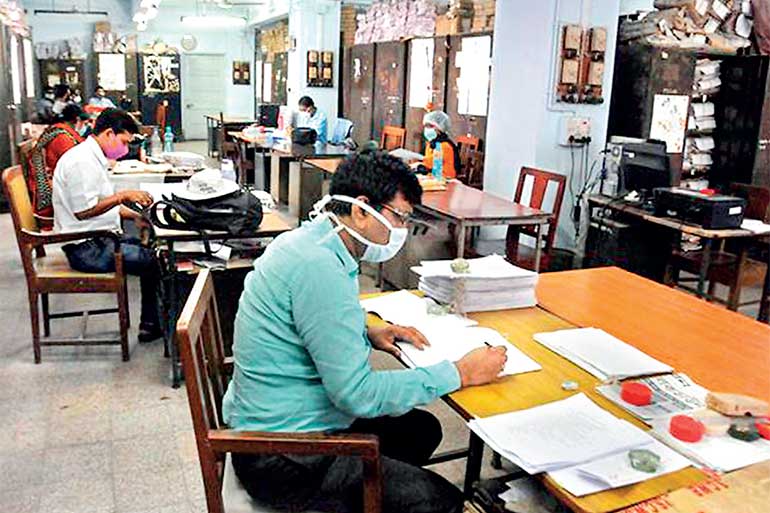Tuesday Feb 17, 2026
Tuesday Feb 17, 2026
Thursday, 22 December 2022 00:31 - - {{hitsCtrl.values.hits}}

If the efficiency of the public service is to be restored, to levels which existed before politicians started forcing their power to control the public servants under the guise of ‘people power’, the rule of retirement at 60 is not the answer

The Government has introduced its policy of retirement at 60 years ostensibly as a measure of reducing its expenditure on public sector salaries. As soon as it was announced the absurdity of an across the Board policy was pointed out and the Government backpedalled somewhat on its ‘clever move’, as there were difficulties in relation to the doctors. However, it now seems to be gazetted as a conclusive decision.
I recall during my time at the Employers Federation of Ceylon (EFC) perhaps in the 1990s, a similar decision was taken and it was a farce far as we could see, as those who were close to the political hierarchy, or were considered essential because of their superior knowledge, were given contracts which were renewed periodically. I know personally there were several in the Ministry of Labour itself who had to be retained. One of those privileged gentlemen who maybe now nearing 80 is still somewhere in the public service!
In order to reduce jobs in the public sector the first step is to purge the service of people who have no discernible work but have been parachuted in because of cronyism and politics. Politicians have always thought that all their cronies who were jobless should be given government jobs and at times we have seen party supporters hoofed out as soon as a new party came into power, and replaced by cronies of the new power. It is a fact that in some instances when the change of government took place, unions affiliated to the government compelled managers who had served under the previous government to leave, merely because these managers complied with political decisions over which they had no control.
The principle universally accepted in the situation of a redundancy is to take out the most junior on the principle of last in first out. This rule is followed based on an identification of the skills needed to run the institution, retaining employees who possessed essential competencies. The last rule was implemented keeping in mind that it should be applied having regard to the numbers within skill groups. In short, one did not keep a senior clerk and send away an engineer. To cut the top off indiscriminately, will inevitably mean you lose the benefit of people with institutional memory and in the current situation it is the older generation of public servants who add value to the department or institution. An application of the rule as envisaged by the Government necessarily requires an adjustment to retain skills through contracts given and this will again be a political decision I am afraid, and not done professionally.
When I first had knowledge of a retirement age, it was fixed at 55 in the public service with the possibility of Cabinet approval to place retirees on contract thereafter if they were needed. Then the age was extended to 58 and later to 60, also with the same provision. The problem is that there was no examination of the ability of the employee to perform his work and often it was a question of whether the Minister found the employee responsive to his political or personal needs.
If the efficiency of the public service is to be restored, to levels which existed before politicians started forcing their power to control the public servants under the guise of ‘people power’, the rule of retirement at 60 is not the answer. There was a time when the JVP was urging the people to support them saying that they wanted the older generation to quit and to replace them with young people. That is fine so long as the young employee has the same skills as the older employee.
The policy of the Government is also contrary to the ILO Convention on discrimination which forbids discrimination based on age! The principle to be followed is that a person who is equal to another in terms of job requirements should not be discriminated against merely because of age. In the US this principle is adhered to and that is the reason why a judge could function into his nineties. The President, Prime Minister and the former President Mahinda Rajapaksa are all over 70? If you were claiming equal opportunity, they should also make way for people under 60! They, I am sure, feel that their political skills are superior to those of their junior colleagues?
An essential cadre should be determined in each public institution or department. How many bodies does one need for an efficient performance of these institutions? Examine the competencies of the people within and their physical and mental position, and having identified these, employees who cannot perform and those who are redundant, could be retired. I have once before written on the need for a scheme to redeploy people who will lose their employment so that they could be part of the economic recovery and not resent moves to make the public institutions vibrant.